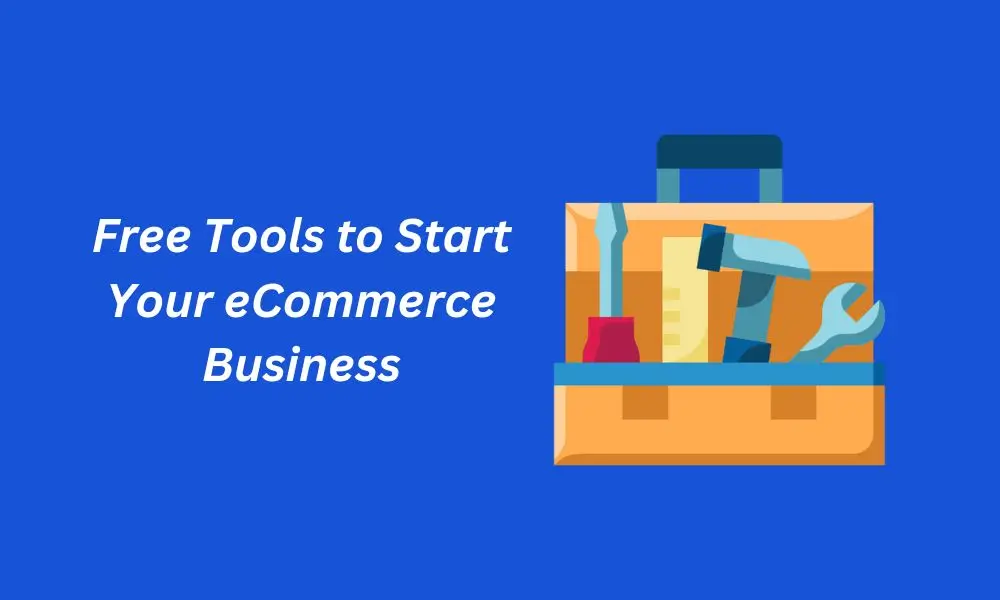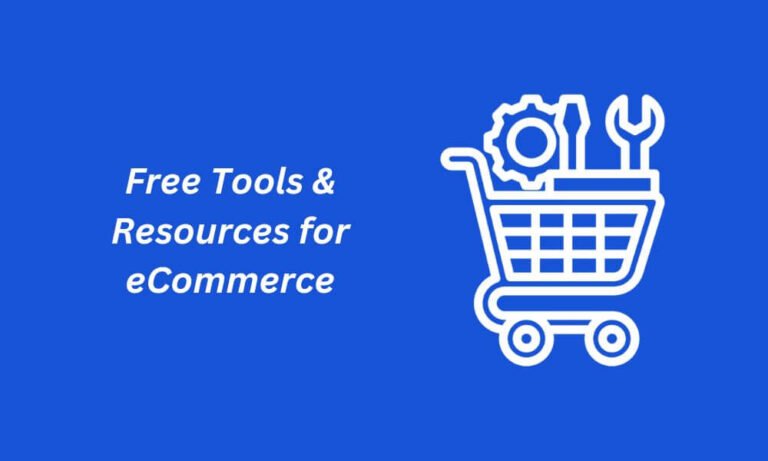Are you looking for free tools to help you start your eCommerce business? If your answer to this question is yes, then you’re at the right place.
Introduction
Starting an eCommerce business from scratch can be daunting, especially if you’re working with limited resources. I know the feeling, having started my own ventures like my men’s clothing store Y-Men’s and a digital downloads site.
The good news is that there are numerous free tools available to help you build, grow, and manage your eCommerce business without breaking the bank. Whether you’re just getting started or are already on the path to growth, these tools will help you achieve your goals.
In this blog post, I’ll take you through ten of the best free tools that have helped me and many others succeed in the eCommerce space. Let’s dive in!
Table of Contents
Free Tools to Help You Start Your eCommerce Business
Now let’s take a look at the free tools to help you start your eCommerce business. These tools come in handy if you’re under low budget or just starting out.
1. Canva – Design Like a Pro
When you’re starting out, creating visually appealing content can be expensive, especially if you don’t have the budget for a designer. Canva is a free online design tool that allows anyone to create high-quality graphics for their store. Whether it’s product images, social media posts, or website banners, Canva provides a simple drag-and-drop interface with thousands of customizable templates.
Why it’s awesome for eCommerce:
- Create professional-looking product visuals for your website or Instagram.
- Use it to design promotional materials such as banners, flyers, and email headers.
- Customize templates to fit your brand’s color scheme, making your store look polished.
Tip: Use Canva to create mockups for your product ideas, especially if you’re in the dropshipping business or testing products before committing to inventory.
2. Shopify’s Free Trial – Build and Launch Your Store
Although Shopify is a paid platform, they offer a 14-day free trial that allows you to get started without upfront costs. If you’re looking to test your eCommerce idea, Shopify’s intuitive interface is great for beginners. You can set up a store, add products, and even make sales before you need to commit financially.
Why it’s awesome for eCommerce:
- Easy to use for beginners with no coding experience required.
- Hundreds of free templates and themes to choose from.
- Integrates with payment gateways and shipping options seamlessly.
Tip: Take advantage of Shopify’s free trial to create a fully functional store and drive some early traffic to see if your product has demand.
3. Google Analytics – Track Your Store’s Performance
Understanding your store’s traffic and performance is crucial to growing your eCommerce business. Google Analytics is a free tool that allows you to track visitor data, including where your audience is coming from, how they interact with your site, and which products are driving the most engagement.
Why it’s awesome for eCommerce:
- Helps you optimize your store’s performance by understanding user behavior.
- Provides insights into which marketing channels are working best for you.
- Track conversion rates, sales, and other key performance metrics.
Tip: Pair Google Analytics with Google Search Console to get a full picture of your website’s SEO performance.
4. Mailchimp – Email Marketing on a Budget
Email marketing remains one of the most effective channels for driving eCommerce sales. Mailchimp is a free email marketing tool that lets you manage your email list, design campaigns, and send emails to up to 500 contacts for free. This is ideal when you’re just starting out and building your customer base.
Why it’s awesome for eCommerce:
- Easy-to-use email templates that require no coding.
- Built-in analytics to track email performance.
- Integrates easily with Shopify, WooCommerce, and other platforms.
Tip: Use Mailchimp’s free plan to set up abandoned cart emails, which can recover potential lost sales from users who didn’t complete their purchase.
5. Google Trends – Validate Your Product Idea
Before you invest time and money into your eCommerce business, it’s important to validate your product idea. Google Trends is a free tool that allows you to see how search interest for certain keywords has changed over time, providing valuable insight into what’s trending and what might soon become popular.
Why it’s awesome for eCommerce:
- Allows you to compare different product ideas and niches.
- Helps identify seasonality in product demand.
- Shows geographical interest in particular products.
Tip: Use Google Trends to identify potential winning products and avoid selling items that are already on the decline.
6. Hootsuite Free Plan – Manage Your Social Media Presence
Social media is an essential marketing channel for eCommerce businesses. Hootsuite offers a free plan that lets you manage up to three social media profiles in one place. You can schedule posts, track engagement, and manage your social media strategy without having to spend anything.
Why it’s awesome for eCommerce:
- Allows you to schedule posts across multiple platforms like Instagram, Facebook, and Twitter.
- Simplifies the process of managing different social accounts in one dashboard.
- Provides performance analytics to help you refine your social media strategy.
Tip: Use Hootsuite to schedule posts promoting your new products or sales ahead of time to ensure you have consistent social media activity.
7. Oberlo – Find Products for Dropshipping
If you’re thinking about starting a dropshipping business like I did with my digital downloads store, Oberlo is a free tool that integrates with Shopify and allows you to find products to sell in your store without having to manage inventory. Oberlo connects you with suppliers, and they handle the shipping, allowing you to focus on marketing and sales.
Why it’s awesome for eCommerce:
- Perfect for entrepreneurs who don’t want to invest in physical inventory.
- Easy to import products directly into your Shopify store.
- Offers insights into product ratings and supplier performance.
Tip: Start with Oberlo’s free plan and upgrade as your business grows and you require more advanced features like bulk order processing.
8. WooCommerce – Build Your eCommerce Site for Free
For those who prefer using WordPress, WooCommerce is an open-source, free eCommerce plugin that turns your website into an online store. With its customizable platform, WooCommerce is perfect if you want more control over your store’s design and functionality.
Why it’s awesome for eCommerce:
- Completely free to use, though some extensions or themes may cost money.
- Fully customizable, allowing you to tailor your store to your exact needs.
- Works seamlessly with WordPress themes and plugins, giving you endless options.
Tip: Take advantage of free themes and plugins in the WordPress directory to reduce your startup costs while building a professional-looking store.
9. Trello – Organize Your Projects and Tasks
Managing an eCommerce business involves juggling multiple tasks, from marketing to order fulfillment. Trello is a free project management tool that helps you organize your workflow, collaborate with your team (even if you’re a one-person show), and keep track of tasks with its easy-to-use boards, lists, and cards.
Why it’s awesome for eCommerce:
- Allows you to visualize your tasks, making project management easier.
- Helps prioritize tasks such as product sourcing, marketing campaigns, or order tracking.
- Offers collaboration tools if you’re working with a team.
Tip: Use Trello to track product launches, marketing efforts, and content schedules for your eCommerce blog or YouTube channel.
10. Google Drive – Store and Share Files
Running an eCommerce business means dealing with a lot of files, whether it’s product images, spreadsheets, or marketing materials. Google Drive offers 15GB of free cloud storage, allowing you to store, organize, and share files with team members or clients.
Why it’s awesome for eCommerce:
- Easily share documents and collaborate with your team, even remotely.
- Store important business documents like inventory spreadsheets, receipts, and contracts.
- Back up your website files to avoid losing important data.
Tip: Use Google Sheets in Google Drive to track inventory, sales, and other metrics without having to purchase additional software.
Conclusion
Starting an eCommerce business can feel overwhelming, but with the right tools, it becomes much easier to manage and scale. These ten free tools, many of which I’ve personally used, can help you streamline your workflow, manage tasks, and create a professional online store without any upfront costs.
Whether you’re like me running a men’s clothing store, a digital downloads website, or a dropshipping business, taking advantage of free tools can significantly lower your expenses while still providing high value. The key is to start simple, make data-driven decisions, and focus on growing step by step.
By leveraging these tools, you’ll be better positioned to compete in the eCommerce landscape and eventually grow your business into a profitable venture. So, what are you waiting for? Start exploring these free tools today and watch your eCommerce dreams come to life!
What free tools have you found useful in your eCommerce journey? Let me know in the comments below!
Frequently Asked Questions
1. What if I’m not tech-savvy? Can I still use these tools to start my eCommerce business?
Absolutely! Many of the tools listed, such as Shopify, Canva, and Trello, are designed to be user-friendly, even for beginners. They offer intuitive interfaces, drag-and-drop features, and tutorials to help you get started quickly. You don’t need any coding or design experience to make the most of these tools.
2. How do I choose the best platform to build my eCommerce store, especially between Shopify and WooCommerce?
Shopify is ideal if you want an all-in-one platform that handles everything from hosting to payment gateways with minimal setup. WooCommerce, on the other hand, is great if you prefer customization and already have a WordPress site. Both platforms offer free options to help you start, but Shopify is generally easier for beginners, while WooCommerce is better suited for those seeking more control and flexibility.
3. Can I really start an eCommerce business without spending any money?
Yes, you can! By leveraging the free versions of the tools mentioned in the blog post, you can build and grow your eCommerce business with zero initial investment. Tools like Google Analytics, Mailchimp, Canva, and Trello all offer free plans that can help you with marketing, design, project management, and performance tracking.
4. How can I validate my product idea before investing in inventory or paid advertising?
Using free tools like Google Trends allows you to assess the demand for your product by analyzing search trends over time. This way, you can determine if a product is gaining or losing popularity. Additionally, using Oberlo for dropshipping lets you test different products without upfront investment in inventory.
5. How do I use Mailchimp’s free plan to increase my eCommerce sales?
Mailchimp’s free plan allows you to manage up to 500 contacts and send up to 1,000 emails monthly. You can use it to send newsletters, promote special offers, and automate abandoned cart emails to recover lost sales. Email marketing is a powerful tool to drive repeat business and keep customers engaged with your store.
6. Can I use these tools to scale my business as it grows, or will I need to pay for upgrades?
Most of the tools mentioned offer free plans that are perfect for starting out, but they also have paid tiers with more advanced features. As your eCommerce business grows, you may find it beneficial to upgrade for better functionality, more storage, or advanced analytics. However, many entrepreneurs find that the free versions provide enough value to help them grow significantly before needing to invest in paid versions.


